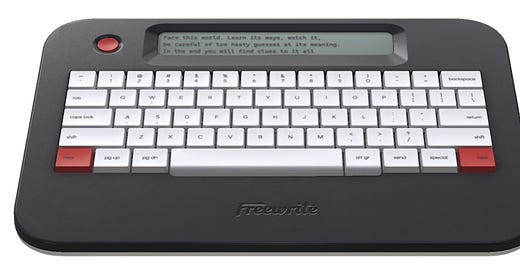This week, I compare writing longhand, typing on a computer, and dictating text for transcription, focusing primarily on journaling. It's not the most exciting topic, but it is fundamental. I employ all three methods to get words on a page to varying degrees of success and enjoyment.
I considered drafting this essay longhand, typing it, and dictating it into my iPhone to generate the same content as an experiment. But each attempt would have constituted practice, and I had already practiced when I wrote in my journal that I was contemplating this subject this week. Most of what we write is practice for more writing, if for nothing else.
The main thing about longhand is it slows me down enough to relax
Let's start with longhand, the slowest process. Longhand is how I write my journal using a Remarkable tablet that automatically recognizes my handwriting. I then copy the text into Microsoft Word for revision. I get all the benefits of longhand (no distractions, tactile connection, etc.) without any drawbacks (it’s still digital, searchable, etc.)
I have been handwriting my journals since 1983. I typed them in the early '90s and the late ‘00s for a while and found that my page count was higher because I could get more words on the page in less time. But more does not always better make. The years I wrote only on a computer produced my most bloated volumes.
The main thing about longhand is it slows me down enough to relax. Writing becomes meditation and feels less like work than typing on my brand-new Freewrite Alpha, which I’m doing now to draft this essay while riding as a passenger in our car.
Sidebar mini Freewrite Alpha review: As a proud owner of all three Freewrite devices, I love the feel of the Alpha’s mechanical keyboard and the clackity-clack sound (though it annoyed my wife, who was driving). The e-ink screen on the Alpha shows three lines of text. But who needs more than three lines? If I am freewriting an article, it's the maximum number of lines I want to see so I can better focus on what to write next instead of being concerned about what I’ve written. That’s for the editing process!
In a perfect world, for poems, I’d prefer to use a manual typewriter as I did in the 80s.
So, I prefer longhand for journals. And for to-do lists, part of the point is repetition, which makes things sink in. (Also, if you must write the same stuff daily, it’s an added incentive to get it done.)
And then there are my essays and poetry, which I prefer typing. Articles like this are always drafted on one of my Freewrite devices, usually on the bus to or from work. In these cases, I am going for brain dumps to quickly get as many words as possible on the page.
In a perfect world, for poems, I’d prefer to use a manual typewriter as I did in the 80s. I like marking up printed drafts with an actual pen, which I’m convinced is one of the best practices for poetry revisions. A recent poem of mine went through ten drafts! But when revising the same document on a computer, my brain still remembers earlier wordings, and I sometimes change things back in subsequent drafts.
I experimented with audio transcription for poetry writing in Paris during my MFA a couple of years ago, doing something called a “walking poem,” talking into my iPhone’s voice memo app while walking along the left bank of the Seine and then transcribing what I said as I walked. It might have helped to be in Paris because the landscape, as it interrupted the narrative, was engaging. I have recently experimented with journaling via audio transcription using Otter.ai’s voice recognition, but only when I could not write. If I edit the transcript, I get close to the quality of writing I get by writing longhand, but I miss the tactile part of the process, and I suspect I’m producing a less contemplative level of content.
I’ve kept an audio journal since 1982 with single entries per year that I’ve never intended to transcribe. But recently, now that the technology exists, I’ve thought an audio transcription of the forty years of tapes would be interesting to read. Reading a few thousand words is quicker than listening to many hours of tape.
Sidebar on audio transcription: Audio transcription may be superior to longhand and typing when notetaking in meetings. There is supposed to be a reinforcement of ideas generated when you handwrite notes while listening to speakers. However, automatically generated transcripts, which allow you to give total concentration while receiving detailed notes with tagged speakers, are the best experience. If only automatic audio transcripts had been available in college when people sometimes taped lectures on their tape recorders to listen to again as part of their studying.
Overall, I hesitate to conclude decisively if any of the three – longhand, typing, or audio transcription is superior. Pluses and minuses are on each side, like in the debate between reading versus listening to audiobooks. Like with many things, it depends on your preference and what you’re going for.




